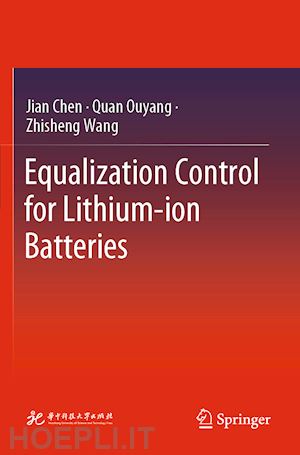
Questo prodotto usufruisce delle SPEDIZIONI GRATIS
selezionando l'opzione Corriere Veloce in fase di ordine.
Pagabile anche con Carta della cultura giovani e del merito, 18App Bonus Cultura e Carta del Docente
This book provides readers with sufficient insight into battery equalization control technologies from both theoretical and engineering perspectives. Distinguished from most of the existing works that focus on the hardware design of active equalizers, this book intends to comprehensively introduce equalization control strategies for lithium-ion battery packs. The validity and reliability of the control strategies in this book have been verified by theory and experiments.
This book summarizes the battery equalization technologies from the equalization system to the equalization control algorithm. From this book, readers who are interested in the area of battery management can have a broad view of cell equalization technologies. Readers who have no experience in the battery management area can learn the basic concept, analysis methods, and design principles of the cell equalization system for battery packs. Even for the readers who are occupied in this area,this book provides rich knowledge on engineering applications and future trends of battery equalization control.
Dr. Jian Chen received the B.E. and M.E. degrees from Zhejiang University, Hangzhou, China, in 1998 and 2001, respectively, and the Ph.D. degree in Electrical Engineering from Clemson University, Clemson, SC, USA, in 2005. He was Research Fellow with the University of Michigan, Ann Arbor, MI, USA, from 2006 to 2008, where he was involved in fuel cell modeling and control. In 2013, he joined the Department of Control Science and Engineering, Zhejiang University, where he is currently Professor with the School of Mechanical Engineering, Zhejiang University. His research interests include modeling and controlling fuel cell systems, vehicle control and intelligence, visual servo techniques, battery management systems, and nonlinear control.
Dr. Quan Ouyang received the Bachelor's degree in Automation from Huazhong University of Science and Technology, Wuhan, China, in 2013 and the Ph.D. degree in Control Science and Engineering from Zhejiang University, Hangzhou, China, in 2018. In 2022, he joined Chalmers University of Technology as the Marie Sklodowska-Curie Actions- Postdoctoral Fellow. He is currently Associate Professor with the College of Automation Engineering, Nanjing University of Aeronautics and Astronautics, Nanjing, China. His research interests mainly include battery management, modeling and control of fuel cell systems, and nonlinear control.
Dr. Zhisheng Wang received the B.E. degree in Hydromechanical Automation from Xi'an Aeronautical University, Xi'an, China, in 1990, and the M.S and Ph.D. degrees in Navigation Guidance and Control from Northwestern Polytechnical University, Xi'an, China, in 1999 and 2002, respectively. In 2002, he joined the College of Automation Engineering, Nanjing University of Aeronautics and Astronautics (NUAA), Nanjing, China, where he is currently Full Professor with the Department of Automation Control Engineering. From 2002 to 2004, he was Postdoctoral Fellow with the College of Automation Engineering, NUAA. From 2008 to 2010, he was Postdoctoral Fellow with the School of Mechanical Engineering and Automation, National University of Defense Technology, Changsha, China. From 2010 to 2011, he was Visiting Professor with Stockholm University, Stockholm, Sweden. His research interests include information fusion, battery management, fusion control, and computer vision.











Il sito utilizza cookie ed altri strumenti di tracciamento che raccolgono informazioni dal dispositivo dell’utente. Oltre ai cookie tecnici ed analitici aggregati, strettamente necessari per il funzionamento di questo sito web, previo consenso dell’utente possono essere installati cookie di profilazione e marketing e cookie dei social media. Cliccando su “Accetto tutti i cookie” saranno attivate tutte le categorie di cookie. Per accettare solo deterninate categorie di cookie, cliccare invece su “Impostazioni cookie”. Chiudendo il banner o continuando a navigare saranno installati solo cookie tecnici. Per maggiori dettagli, consultare la Cookie Policy.